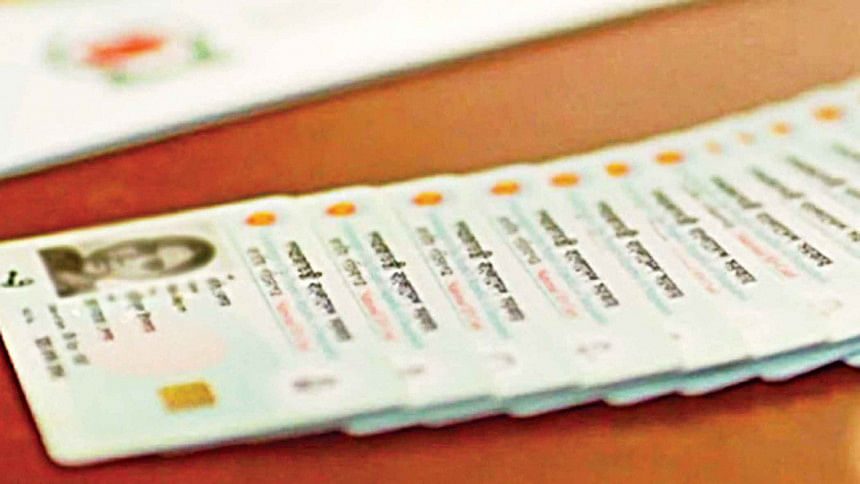Will Ankhi be able to take the SSC exam this year?

I have known Ankhi since she was two-years-old. She is the daughter of Ali and Kohinoor who have struggled their entire life to support their children as they climb the steps to get out of poverty through education. As a child, she was extremely curious and had a twinkle in her eyes. Ankhi started her early education in the free primary school run by the Dhaka Ladies Club in a tiny space of a garage. As a two-year-old, Ankhi would ask me questions about America and would always ask before I headed for the airport to return to Boston: "Where are you going?"
Ankhi's father took care of my bed-ridden father-in-law until he passed away in 2013. Her mother, Kohinoor, worked for my mother-in-law even after that but her health conditions prevented her from working as a cook in the latter's household. They moved to their ancestral home in a village of Alfa Danga in the Faridpur district, and I lost touch with them after that.
I recently heard that Ankhi travelled from her village to my mother-in-law's apartment in Dhaka in search of her father, because she needs a copy of her father's NID which is required to register for the upcoming SSC exam.
Ali moved from his hometown in Sylhet to Dhaka in the 1980s in search of better opportunities. He was a pre-teen then, and connected with my in-laws and started working for them as a jack-of-all-trades. Ironically, he never got an NID even though he was one of the smartest operators I have known in the past 25 years.
Unfortunately, Ankhi needs a copy of both her parents' NIDs to register for the SSC exam. According to the government's rules, a candidate needs, among other documents, a birth certificate and both parents' NID cards. Her birth certificate was never issued even though her mother gave birth to her only daughter at a Dhaka clinic.
Ali worked hard as a young boy and in all subsequent years. After a few years of working as a handyman, caretaker, and night guard, Ali decided to seek a more lucrative job in the garments industry. He abandoned his family, and Kohinoor was left to raise her young children as a single mom. A few years ago, Kohinoor moved back to her ancestral home in Faridpur and was able to eke out a living with the assistance of her stepmother and other relatives. But, life was always tough for this frail woman who had bouts of diabetes and other illnesses. Nonetheless, she was able to garner all the resources needed to send her children to schools and penny pinched to send her children to the schools in the villages of Alfa Danga.
Mohsin, the eldest son, finished his SSC and HSC and moved from Faridpur to Dhaka to look for a job. He worked as a delivery man for an online grocery store in Shahzadpur, near Gulshan, but the hard routine of riding a bicycle for long hours got to his health. He left the job in Dhaka and went back to live with his mother for a few months in 2021. Now he is seeking employment again. Shakil finished high school and passed the SSC examinations. He was looking for a job that would not be very physically demanding, and without finding one, began to work on a ship as a loader for a navigation company.
Ankhi managed to finish high school in the village and was successful in evading the eyes of "big brothers", rural morols and potential matchmakers and plans to take the SSC examination beginning in June. But, her registration is not complete yet. She still faces many obstacles. Her father Ali now works as a "darwan" in Dhaka but has neither the resources nor the connections he needs to get an NID in such a short time. So, Ankhi is going back to her village where the headmaster might be able to pull strings to get her registered for the SSC exam. The cost of these back-channel methods is beyond the family's reach, and they still might not be able to get all the paperwork finished to complete the registration process on time.
It's a familiar story for the underprivileged classes in Bangladesh. There are many Ankhis who have to overcome all the hurdles as they seek to better their lives. Even a birth certificate costs Tk 1,800 and the going rate for an NID is Tk 5,000, including the fees and middlemen's commissions. Obviously, these documents are necessary in a modern economy to buy land and for voter registration. However, there are many individuals who cannot afford the expenses and might decide to forego these perks of life. Fortunately, the backdoor channels and informal administration structure might still provide an escape route for Ankhi and others like her.
Dr Abdullah Shibli is an economist and works for Change Healthcare, Inc., an information technology company. He also serves as Senior Research Fellow at the US-based International Sustainable Development Institute (ISDI).

 For all latest news, follow The Daily Star's Google News channel.
For all latest news, follow The Daily Star's Google News channel. 



Comments